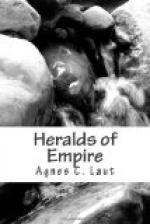Le Borgne drew off to confer with the braves. Then he came back and there was a treacherous smile of welcome on his bronze face.
“The Indians thought the white-men spies from the Little White Sticks,” he explained in the mellow, rhythmic tones of the redman. “The Indians were in war council. The Indians are friends of the French.”
“Look out for him, Godefroy,” said I.
“If the French are friends to the Indians, let the white-men come to battle against the Little White Sticks,” added Le Borgne.
“Tell him no! We’ll wait here till they come back!”
“He says they are not coming back,” answered Godefroy, “and hang me, Ramsay, an I’d not face an Indian massacre before I go back empty-handed to M. Radisson. We’re in for it,” says he, speaking English too quick for Le Borgne’s ear. “If we show the white feather now, they’ll finish us. They’ll not harm us till they’ve done for the English and got more muskets. And that red pirate is after these same furs! Body o’ me, an you hang back, scared o’ battle, you’d best not come to the wilderness.”
“The white-men will go with the Indians, but the white-men will not fight with the Little Sticks,” announced Godefroy to Le Borgne, proffering tobacco enough to pacify the tribe.
’Twas in vain that I expostulated against the risk of going far inland with hostiles, who had attacked the New England fort and were even now planning the slaughter of white-men. Inoffensiveness is the most deadly of offences with savagery, whether the savagery be of white men or red. Le Borgne had the insolence to ask why the tribe could not as easily kill us where we were as farther inland; and we saw that remonstrances were working the evil that we wished to avoid—increasing the Indians’ daring. After all, Godefroy was right. The man who fears death should neither go to the wilderness nor launch his canoe above a whirlpool unless he is prepared to run the rapids. This New World had never been won from darkness if men had hung back from fear of spilt blood.
’Twas but a moment’s work for the braves to deck out in war-gear. Faces were blackened with red streaks typifying wounds; bodies clad in caribou skins or ermine-pelts white as the snow to be crossed; quivers of barbed and poisonous arrows hanging over their backs in otter and beaver skins; powder in buffalo-horns for those who had muskets; shields of toughened hide on one arm, and such a number of scalp-locks fringing every seam as told their own story of murderous foray. While the land still smoked under morning frost and the stars yet pricked through the gray darkness, the warriors were far afield coasting the snow-billows as on tireless wings. Up the swelling drifts water-waved by wind like a rolling sea, down cliffs crumbling over with snowy cornices, across the icy marshes swept glare by the gales, the braves pressed relentlessly on. Godefroy, Jack Battle, and I would have hung to the rear and




